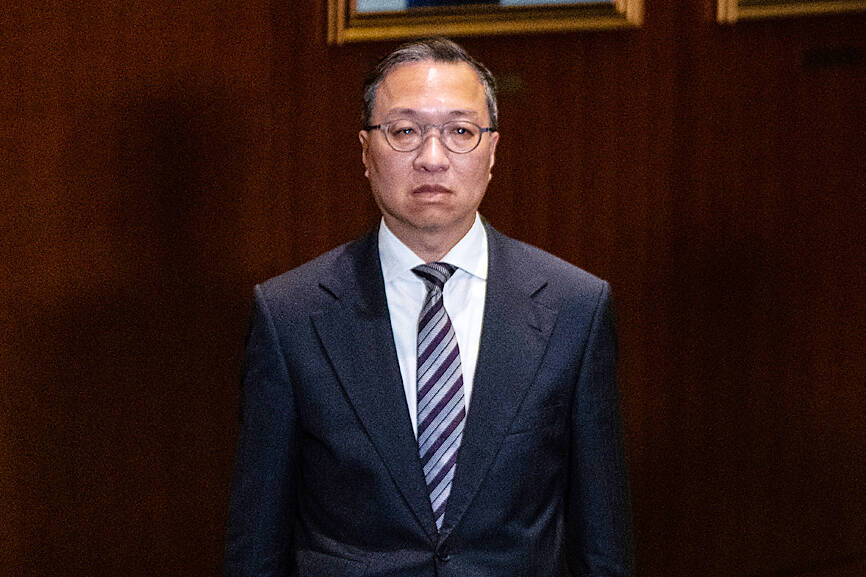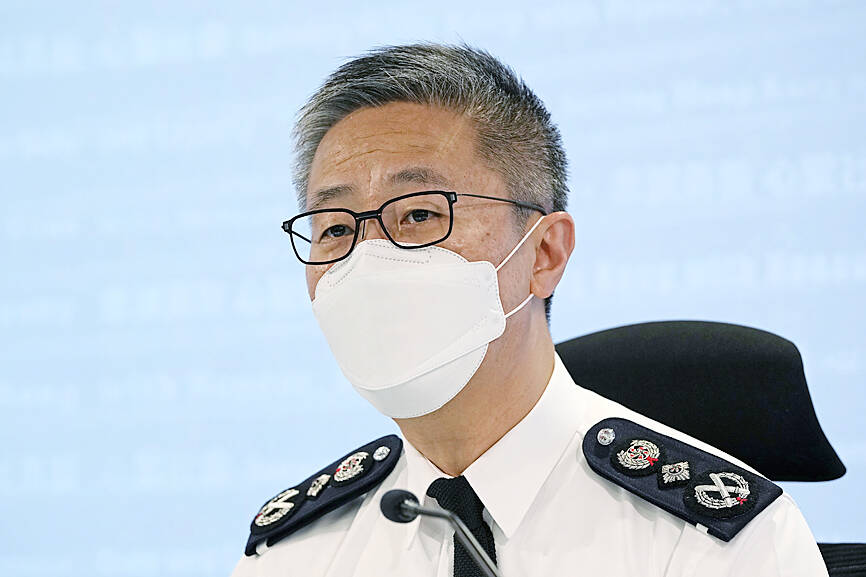The US has sanctioned six Chinese and Hong Kong officials who it alleged were involved in “transnational repression” and acts that threaten to further erode the territory’s autonomy, with Beijing threatening to take countermeasures.
The six officials included Hong Kong Secretary for Justice Paul Lam (林定國), Director of the Office for Safeguarding National Security in Hong Kong Dong Jingwei (董經緯) and Police Commissioner Raymond Siu Chak-yee (蕭澤頤).
“Beijing and Hong Kong officials have used Hong Kong national security laws extraterritorially to intimidate, silence and harass 19 pro-democracy activists who were forced to flee overseas, including a US citizen and four other US residents,” the US Department of State said.

Photo: AP
The statement dated Monday said the six officials sanctioned were linked to entities or actions that engaged in coercing, arresting, detaining or imprisoning individuals under the authority of Hong Kong’s National Security Law, or implementing the law.
The other three officials were Sonny Au (區志光), secretary-general of the Committee for Safeguarding National Security in Hong Kong, and assistant police commissioners Dick Wong (王忠巡)and Margaret Chiu (趙詠蘭).
Since Beijing imposed a national security law in 2020 to quell the 2019 massive anti-government protests, Hong Kong authorities have prosecuted many leading activists in the former British colony, which returned to Chinese rule in 1997.

Photo: AP
The Hong Kong office of the Chinese Ministry of Foreign Affairs condemned the sanctions, saying they again exposed the ill-intention of the US to undermine Hong Kong’s prosperity and contain China’s development.
It urged Washington to stop interfering in Hong Kong’s affairs.
“China will surely take effective countermeasures against these despicable acts by the US!” it said in a statement.
In Beijing, Chinese Ministry of Foreign Affairs spokesman Guo Jiakun (郭嘉昆) said China would take resolute countermeasures for any wrong actions by the US.
He said the actions taken by Hong Kong police against “anti-China elements” who fled abroad were carried out according to the law and that the US has no right to interfere with the territory’s national security cases.
Condemning the US over the sanctions, the Hong Kong government said it despises them and is not intimidated by them.
“It, once again, clearly exposed the US’ barbarity under its hegemony, which is exactly the same as its recent tactics in bullying and coercing various countries and regions,” it said in a statement.
It said the “absconders” mentioned by the US government are wanted for arrest, because they continued to blatantly engage in activities endangering national security overseas.
It said the US has given cover for those “who have committed these evil deeds,” and therefore it was necessary for Hong Kong to take lawful measures to combat the acts.
“The imposition of the so-called ‘sanctions’ in the guise of defending human rights and democracy indeed constitute a demonstration of shameless hypocrisy with double standards on the part of the US,” it said.
Lam said the sanctions” do not affect my work; they do not affect my life.”
He said the sanctions represented “blatant tyrannical bullying intended to deter people from participating in safeguarding national security” in a statement.
However, Frances Hui (許穎婷), one of the overseas-based activists targeted by the authorities, wrote on X that it was a critical step in addressing the territory’s worsening crackdown.
She said they hoped it marked the beginning of a sustained effort to hold perpetrators accountable.

Right-wing political scientist Laura Fernandez on Sunday won Costa Rica’s presidential election by a landslide, after promising to crack down on rising violence linked to the cocaine trade. Fernandez’s nearest rival, economist Alvaro Ramos, conceded defeat as results showed the ruling party far exceeding the threshold of 40 percent needed to avoid a runoff. With 94 percent of polling stations counted, the political heir of outgoing Costa Rican President Rodrigo Chaves had captured 48.3 percent of the vote compared with Ramos’ 33.4 percent, the Supreme Electoral Tribunal said. As soon as the first results were announced, members of Fernandez’s Sovereign People’s Party

MORE RESPONSIBILITY: Draftees would be expected to fight alongside professional soldiers, likely requiring the transformation of some training brigades into combat units The armed forces are to start incorporating new conscripts into combined arms brigades this year to enhance combat readiness, the Executive Yuan’s latest policy report said. The new policy would affect Taiwanese men entering the military for their compulsory service, which was extended to one year under reforms by then-president Tsai Ing-wen (蔡英文) in 2022. The conscripts would be trained to operate machine guns, uncrewed aerial vehicles, anti-tank guided missile launchers and Stinger air defense systems, the report said, adding that the basic training would be lengthened to eight weeks. After basic training, conscripts would be sorted into infantry battalions that would take

GROWING AMBITIONS: The scale and tempo of the operations show that the Strait has become the core theater for China to expand its security interests, the report said Chinese military aircraft incursions around Taiwan have surged nearly 15-fold over the past five years, according to a report released yesterday by the Democratic Progressive Party’s (DPP) Department of China Affairs. Sorties in the Taiwan Strait were previously irregular, totaling 380 in 2020, but have since evolved into routine operations, the report showed. “This demonstrates that the Taiwan Strait has become both the starting point and testing ground for Beijing’s expansionist ambitions,” it said. Driven by military expansionism, China is systematically pursuing actions aimed at altering the regional “status quo,” the department said, adding that Taiwan represents the most critical link in China’s

‘REALLY PROUD’: Nvidia would not be possible without Taiwan, Huang said, adding that TSMC would be increasing its capacity by 100 percent Nvidia Corp CEO Jensen Huang (黃仁勳) on Saturday praised and lightly cajoled his major Taiwanese suppliers to produce more to help power strong demand for artificial intelligence (AI), capping a visit to the country of his birth, where he has been mobbed by adoring fans at every step. Speaking at an impromptu press conference in the rain outside a Taipei restaurant, where he had hosted suppliers for a “trillion-dollar dinner,” named after the market capitalization of those firms attending, Huang said this would be another good year for business. “TSMC needs to work very hard this year because I need a lot